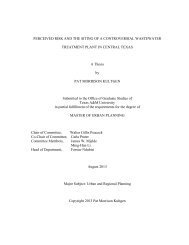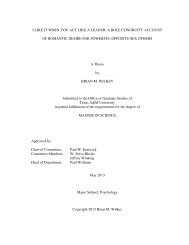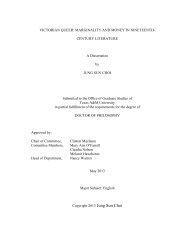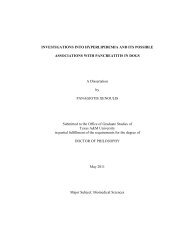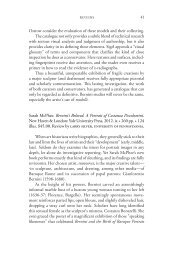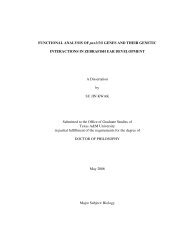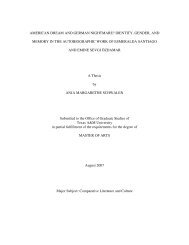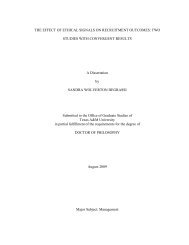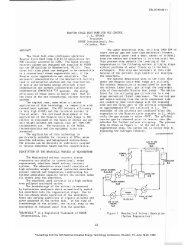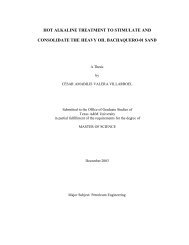A Dissertation by GRACE HUI-CHIN LIN Submitted to the Office of ...
A Dissertation by GRACE HUI-CHIN LIN Submitted to the Office of ...
A Dissertation by GRACE HUI-CHIN LIN Submitted to the Office of ...
You also want an ePaper? Increase the reach of your titles
YUMPU automatically turns print PDFs into web optimized ePapers that Google loves.
finally would be able <strong>to</strong> attain <strong>the</strong>ir purpose <strong>of</strong> expressing intended meanings.<br />
Politeness<br />
The issue <strong>of</strong> politeness was mentioned a great deal in <strong>the</strong> first findings <strong>of</strong> this<br />
study. Many students believed that “<strong>to</strong>pic avoidance” was not a very appropriate<br />
strategy, not only because it did not express clearly <strong>the</strong>ir need <strong>to</strong> change <strong>the</strong> <strong>to</strong>pic, but<br />
it could cause confusion in <strong>the</strong> speakers.<br />
Actually, <strong>the</strong> issue <strong>of</strong> politeness in communication was regarded as significant<br />
both in <strong>the</strong> east and west. According <strong>to</strong> Confucius (551-479 BCE), anyone who<br />
possesses <strong>the</strong> fine virtues <strong>of</strong> politeness, <strong>to</strong>lerance, generosity, honesty, diligence, and<br />
benevolence would be regarded as a person <strong>of</strong> humanity. He persuaded Chinese<br />
people <strong>to</strong> be polite because politeness saved one from insults <strong>by</strong> o<strong>the</strong>rs. In Analects<br />
<strong>of</strong> Confucius, he noted that, “Without politeness, <strong>the</strong> respectfulness becomes<br />
laborious bustle. Without politeness, <strong>the</strong> carefulness becomes timidity. Without<br />
politeness, <strong>the</strong> courage becomes insubordination. Without politeness, <strong>the</strong> frankness<br />
becomes rudeness” (Confucius, BC 500, Taibo). He argued, “if it is not polite, don’t<br />
listen <strong>to</strong> it; if it is not polite, don’t say it” (Confucius, BC 500, Yenyun).<br />
In comparison, Brown and Levinson (1987) and Leech (1983) in <strong>the</strong> west also<br />
emphasized <strong>the</strong> importance <strong>of</strong> politeness in communication. Leech (1983) provided<br />
pragmatic principles for gaining politeness in communication. Fur<strong>the</strong>rmore, Brown<br />
and Levinson (1987) pointed out that if <strong>the</strong> speeches were not articulated in a polite<br />
way, <strong>the</strong>y might cause potential face-threatening situations, especially in <strong>the</strong> speech<br />
acts <strong>of</strong> requests and invitations.<br />
In this study, many students discussed <strong>the</strong> importance <strong>of</strong> politeness for <strong>the</strong><br />
strategy <strong>of</strong> <strong>to</strong>pic avoidance. Their statement was similar <strong>to</strong> Watts, Ide, and Ehlih’s<br />
178



